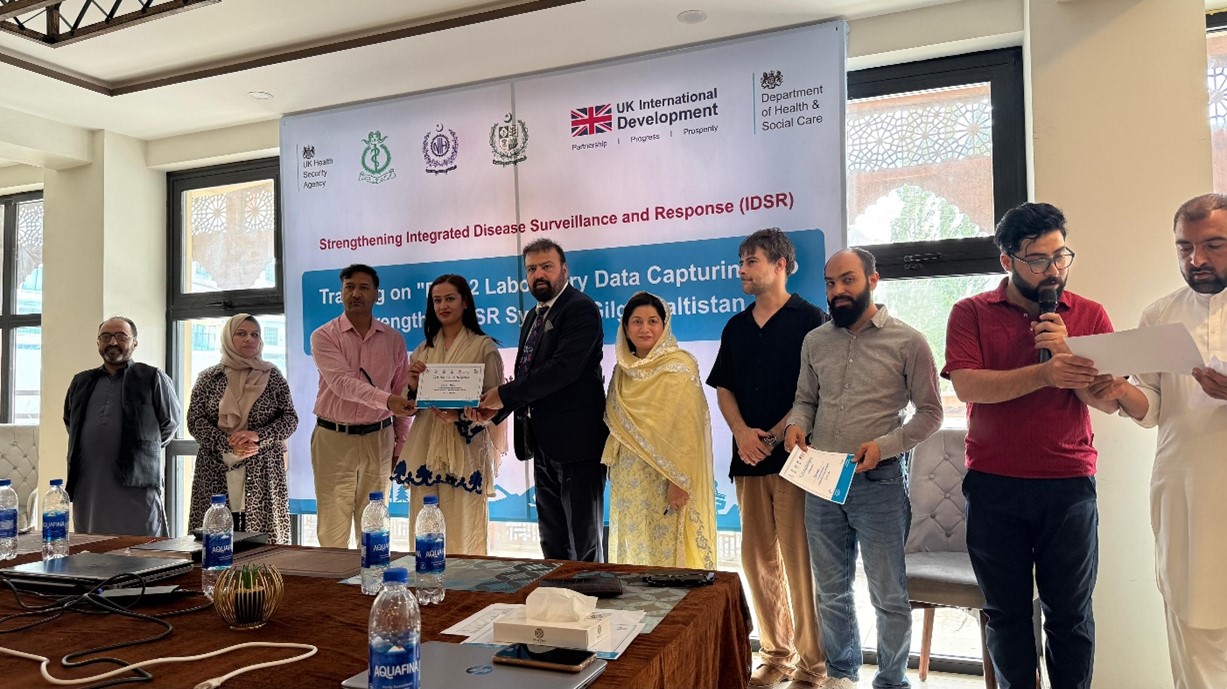
Gilgit-Baltistan (GB) has achieved a major milestone in disease surveillance with the launch of its first integrated laboratory network, connecting 18 facilities across nearly all districts of the region to strengthen Pakistan's health security defences. For the first time, laboratories participating in the provincial IDSR network will now systematically capture and analyse data that can be linked to the national IDSR system, enabling disease trends to be tracked and acted upon in a timely and effective way. The initiative is part of the ongoing support from the UK Health Security Agency (UKHSA) International Health Regulations Strengthening Project (IHR-SP) in partnership with Pakistan’s National Institute of Health (NIH) and wider partners to advance Integrated Disease Surveillance and Response (IDSR) across Pakistan.
Establishing GB’s laboratory network
Following recommendations from the 2023 Joint External Evaluation (JEE), the National Institute of Health (NIH) and IHR-SP developed a roadmap to establish IDSR Lab Networks across Pakistan’s provinces and regions. Following this, a consultative meeting in GB brought together key stakeholders to raise awareness and secure support from the GB Health Department to establish the IDSR Lab Network in the province.
With the support of the GB Health Department, IHR-SP and NIH carried out mapping and baseline assessments of the laboratories working in public sector health facilities of the region, and 18 laboratories were selected for inclusion.
In June 2025, the initiative brought together the laboratory heads, GB Health Department representatives, NIH officials, and UKHSA IHR-SP experts for the first time to formally establish the new network. It also introduced laboratory scientists to key concepts such as IHR core capacities, IDSR, the role of laboratory networks in disease surveillance and the difference between clinical and public health laboratories. The group also made an agreement to use the digital platform of the District Health Information System (DHIS-2) for lab data capturing and alignment with IDSR.
Building local capacity
To begin building local capacity to run the network, IHR-SP laboratory and IT technical advisers designed and delivered a two-day training workshop on laboratory data capturing and analytics to 36 participants from the 18 network laboratories. Each participating laboratory sent a pathologist, microbiologist, or lab scientist, alongside a technologist, technician, or data entry operator. Representatives from the Regional Public Health Lab, the GB Health Department, and NIH also took part.
The practical training focused on using the District Health Information System (DHIS-2) digital platform – the same system successfully implemented in Sindh province. It aimed to equip participants with the skills to capture and analyse lab data using DHIS-2,through hands-on experience in data entry, visualisation, and dashboard management through interactive exercises and group presentations.
This training represents an important step for the province in its efforts to align with the IDSR laboratory network roadmap, as laboratory data on priority diseases will now be systematically captured for the first time. Importantly, this provincial data will link to the national IDSR system so that disease trends can be tracked, analysed and acted upon – offering a clearer, more reliable and timely picture of any emerging public health threats.
Speaking at the event, Dr Muhammad Sartaj, UKHSA Country Lead, emphasised the importance of local ownership and sustainability, “This initiative is not just about building systems; it’s about empowering provincial teams to lead on disease surveillance and response. Gilgit-Baltistan has shown strong commitment, and we are proud to support this transformative journey.”
Strengthening partnerships
In addition to the formal training, the UKHSA team held strategic meetings with key stakeholders, including the Assistant Director for Public Health, District Health Officers of Skardu and Gilgit, and laboratory leaders. These discussions explored opportunities for collaboration in diagnostics, data sharing, and capacity building.
The team also visited the District Health Hospital in Skardu and met with the Medical Superintendent and Lab Lead. The visit provided valuable insights into local challenges and opportunities for strengthening diagnostic services.
A courtesy meeting was also held with the Regional Manager of the Aga Khan Foundation to express appreciation for their logistical support and to explore avenues for future collaboration.
The visit concluded with a renewed sense of partnership and a shared commitment to improving public health surveillance in Gilgit-Baltistan.
Looking forward
The network will enable laboratory data to be captured in the province's surveillance system for the first time, linking local facilities to national disease monitoring. Further discussions are underway to expand the network to include private sector laboratories.
Also By
- First-of-its-kind Community-Based Surveillance Training in Mardan to Boost Pakistan’s Disease Preparedness and response
- Emergency disease surveillance system in action for recurrent floods in Pakistan
- Expanding Sindh’s Integrated Disease Surveillance and Response Network (IDSR) Laboratory Network to private laboratories
Useful Resources
Related Articles
-
Bridging the public-private sector gap in Karachi’s Integrated Disease and Surveillance (IDSR) hospital network
BY Dr Muhammad Sartaj, Mirza Zeeshan Iqbal Baig, Najma -
Pioneering training on “District Health Information System-2” to strengthen Integrated Disease Surveillance and Response System in laboratories in Sindh province of Pakistan
BY IHR -
From vision to action: Sindh’s IDSR Lab Network Review marks key progress in Pakistan’s IDSR journey
BY Dr Muhammad Sartaj -
Punjab takes critical step in IDSR laboratory network development
BY Dr Muhammad Sartaj, Maimoona Junaid, Dr. Muhammad Saeed Akhtar -
Establishing Integrated Disease Surveillance and Response System (IDSR) Laboratory Network in Gilgit Baltistan, 1 August 2024
BY IHR

Please Sign in (or Register) to view further.